Comment on Johnson’s Russia List #36/ Tennison & Ferguson [re: Post-Soviet Political Culture in Russia]

Subject: Comment on Johnson’s Russia List #36/Tennison&Ferguson
Date: Wed, 26 Feb 2014
From: Al Weeks <Aweeks11@comcast.net>
Two postings on JRL, one by Ms. Tennison, the other by Mr. Ferguson, raise some issues that in my opinion, neither writer coped with realistically.
For her part, Sharon Tennison argues that post-1991 Russia has performed what she calls a “miracle” in its recovery from totalitarian Sovietism and Communism. This and other observations she makes reveal, to me at least, a profound neglect of a country’s “inbred” culture and customs and their continuity. Of course, there are no such things, literally, as cultural “genes.” Nevertheless, it is profoundly naive and blindsided to think that countries resemble each other in their inveterately-engendered political and social customs and “styles.”
Any country is unique in this sense. Why, for instance, have most of the East European countries made a relatively smooth transition to liberal-democratic practice while Russia has not? Instead, Russia and its people seem habitually wedded to the Autocracy Principle as, indeed, the country has throughout most of its history (e.g., Putin is overwhelmingly popular in the RF).
Here, in my opinion, Ms. Tennison errs in two ways: First, she is blind to the perpetuation of autocracy in Russia; second, she seems oblivious of the deeply-seated traditions engendered in any nation’s culture, including Russia’s. May I humbly suggest that she read Marquis de Custine’s classic Journey for Our Time and reflect on the continuity of Russian mores and culture? Yes, the book is old. So is good wine.
In the analysis offered by Joseph Ferguson, we ponder the implication he makes that the JRL contributor he criticizes has exaggerated the Chinese threat to Russia, the latter having one-seventh the population of the former while China possesses other geopolitical advantages. He suggests that such a threat might only lie sometime in the future, not today or in the near future. Mr. Ferguson obviously has not been reading the analyses being published (in Russian) by Orientalists in the Russian Academy of Sciences (RAN). Nor, apparently, does he read the Russian Orthodox Church press. In both sources, there are more than mere hints of Russian concern about a “rising” China as there is among rank-file Russians
Instead, Mr. Ferguson claims that such concerns exist only in the minds of “some of the [Russian] elite” and are, in his words, “distant.” However, the fact is that the fear of China presently is deep and widespread in the RF. It is not found only among the borderlands population of Siberia and Far Eastern portions of the RF, or among the formerly Soviet-ruled Central Asian populations. Ferguson naively suggests that if any such fear were there,
it would be addressed publicly by the Russian leadership! That strikes me as comical. It is simply in Russia’s interest today to act as though such concerns do not exist, even when, in fact, they do. Outwardly, an obvious diplomatic game is being played in which Sino-Russian “partnership” is extolled officially (yet, notably, not an alliance, or soyuz) while the U.S., is classed as “hegemonic.”
When the Chinese threat further materializes, whoever then is ruling Russia will resort to a typically Russian turn-about (povorot) and seek Western support against the hostile Eastern “horde.” Recall Stalin’s sudden friendship speech of July 3, 1941, in which he proposed a Russia-West alliance to oppose “Fascism.”
As to Russian approaches to Japan and vice-versa, “molodtsi!” — “nice going, guys”! It’s a reminder to China, where hatred of Japan is being instilled in Chinese school children, that the RF has to look out for its own interests.
